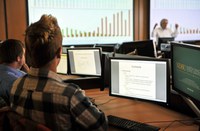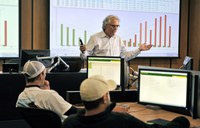Spotlight on Economics: NDSU Commodity Trading Room in Barry Hall
(Click an image below to view a high-resolution image that can be downloaded)
By William W. Wilson, University Distinguished Professor
NDSU Agribusiness and Applied Economics Department
The NDSU Agribusiness and Applied Economics Department is developing a commodity trading room (CTR) and financial laboratory. NDSU has a growing focus in commodity marketing and finance and risk management and this initiative will help it expand its expertise.
The CTR will focus on risk and commodity trading, in addition to finance, portfolio analysis and management. All aspects of risk will be taught using the facilities/technology in the CTR. The major goal of the trading room is to provide a laboratory for teaching about risk related to financial analysis and commodity marketing. There is substantial employer interest in expanded training in these areas.
Specifically, the goals of the initiative are to increase enrollment of students wanting to pursue careers in commodity trading. The CTR will enhance educational opportunities by providing a state-of-the-art teaching platform and escalating the sophistication of training for students.
Risk management has evolved to cover all aspects of agriculture. This initiative will complement activities of the faculty working in this area.
Risk is a dominant issue in all aspects of agribusiness. It includes risks related to price, yield, weather, competitors, technology and food safety. The impact of risk results in more volatility in profits throughout the agricultural sector.
Today, agriculture is three to four times more risky than it was in the 1980s and that risk is expected to persist in future years. It affects all aspects of agriculture and agribusiness, including large and small growers, technology development, input suppliers (production risk), agricultural finance (financial risk), farm programs and crop insurance (safety net risk), logistics, exporting/trading, domestic and off-shore buyers (market, quality and strategic risk), food safety and the rapidly growing biofuels sector (investment analysis, technology development, firm-level risk management and contracting).
The common core of each of these is the need to measure and analyze factors contributing to risk and to evaluate strategies to mitigate risk exposure.
There are five faculty members in the department whose teaching, research and outreach focuses on the varying aspects of risk.
My focus is on risk and strategy. My courses cover commodity trading and risk measurement and I have done extensive research in these areas. Saleem Shaik teaches an undergraduate course in risk analysis and a graduate course in risk analysis and measurement, as well as analytical methods incorporating risk. His research focuses on crop insurance, which has emerged to be critically important to North Dakota and the entire agricultural industry. Ryan Larsen teaches financial investments, how risk impacts investment decisions and how to accurately measure risk. His research is on risk strategies in agriculture and banking investments and geographical diversification for farmers and specialty-crop processors.
Frayne Olson leads the outreach program in areas of risk and risk management. William Nganje is the new department chair and also has extensive interest and has done research in several areas of risk.
As a result of our efforts, there are numerous former NDSU students in the workplace who have this training. In a letter supporting its contribution to NDSU, one of our major sponsors wrote: “NDSU has a long tradition of preparing students for the complex world of agricultural commodity trading, and we are pleased to help NDSU continue this leadership with our investment in the commodity trading room. We are confident it will help develop the next generation of industry leaders.”
The department has defined three courses at the undergraduate level and two at the master’s level that focus on risk. The department also has developed a Certificate of Risk Analysis that can be earned by master’s students across all majors.
The CTR is a high-technology room with live information feeds from financial and commodity markets and includes the ability to analyze portfolios, trading strategies and risks. All of these are important to North Dakota and the region. The room has 32 work stations (20 DTN and 12 Bloomberg) for adopting information/trading technology. Students also will have the tools to analyze regional cash markets.
The research focus of the initiative will include financial analysis of decisions related to risk, commodity marketing and portfolios. Examples include commodity market risk management for age, energy and biofuels (hedging, pricing and logistics); production risk management; crop insurance; risk measurement; analysis of options (financial and real) derivative markets and decision-making, plus stocks/bonds and fixed income investment decisions.
Substantial demand exists for outreach in risk analysis using the CTR. For example, the Northern Crops Institute uses the trading room to teach one-week courses on commodity risk. There also has been interest by a number of agribusinesses to teach courses for midcareer managers.
Funds have been received from various firms and organizations and all the major commodity groups in North Dakota also support the CTR. These contributions are important and reflect the high degree of interest in the project.
NDSU Agriculture Communication – May 17, 2013
| Source: | Bill Wilson, (701) 231-7472, william.wilson@ndsu.edu |
|---|---|
| Editor: | Rich Mattern, (701) 231-6136, richard.mattern@ndsu.edu |




